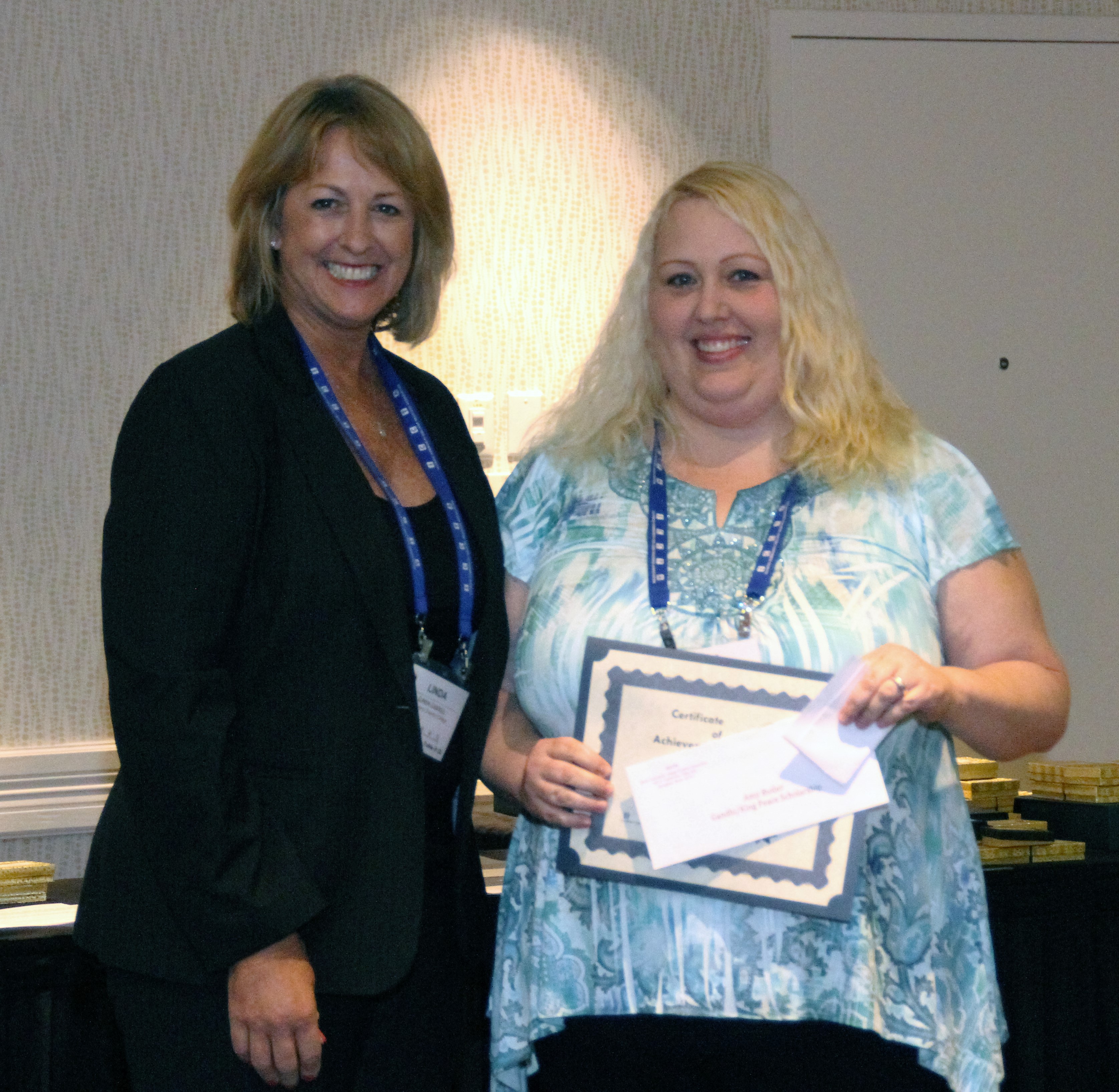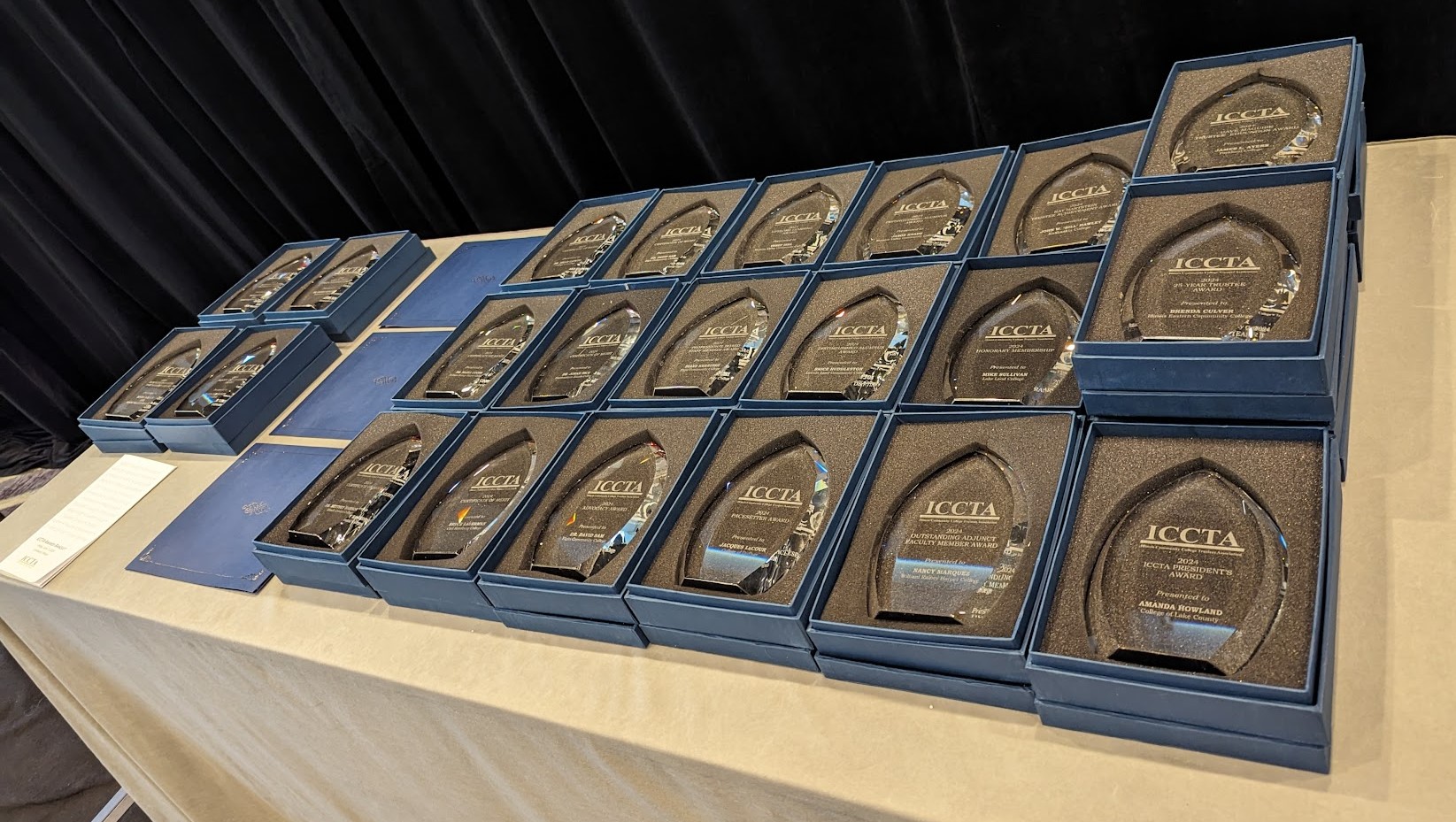ICCTA Gandhi/King Peace Essay Scholarship
2016 Recipient
Amy Butler
John A. Logan College
I have watched the debates, civil disturbances, and marches in regards to current race issues and ongoing discrimination in places like Ferguson, MO, and New York City. Tragically, my race started this specific national madness, and I am sorry.
America desperately needs a racial peace movement. Yet fights for peace on Earth have been going on since the beginning of time.

John A. Logan College student Amy Butler (right) accepts her $500 Gandhi/King Peace Essay Scholarship from ICCTA vice president Linda Liddell.
Mahatma Gandhi and Martin Luther King, Jr., were both known as peaceful world changers. I believe both men encompassed a powerful and abiding inner peace, while promoting change in a tumultuous world. That choice to be at peace is available to everyone, regardless of their age, gender, ethnicity, or life circumstances. This requires love, which includes forgiveness, and results in helping people and society change through nonviolent and passive resistance, and I have decided to pursue it.
Both Mahatma Gandhi and Martin Luther King, Jr., were loving and forgiving people, even while they took a stand against injustices. Gandhi said, "Where there is love, there is life," and "The weak can never forgive. Forgiveness is an attribute of the strong." King said, "I have decided to stick with love. Hate is too great a burden to bear," and "Forgiveness is not an occasional act, it is a constant attitude." Again, love and forgiveness, although often difficult, is a choice everyone gets to make on a daily basis. This decision will release us to feel peace inside, but it does not mean there will be reconciliation. That requires participation from both parties and is something we cannot control. Even these great men, unfortunately, could not achieve that, and subsequently, they both were executed by their enemies.
Their purposes were different, but their tactics were similar. Gandhi's main mission in life was to help India gain independence from Great Britain and establish home rule, while King's passion was for racial equality. They were both successful leaders who chose to lead with peaceful marches and/or nonconformity to authority. After India's independence, Gandhi focused on improving relations between Hindus and Muslims. King tried to improve relations between blacks and whites. They both recognized that all people are equally valuable and desired reconciliation.
Both of these world changers were concerned about others. Gandhi said, "The best way to find yourself is to lose yourself in the service of others." King said, "Life's most persistent question is, ‘What are we doing to help others?'" I am involved in the TRIO program at my community college. It is a federally funded grant aimed at helping at-risk college students and includes Disability Support Services and a campus tutoring program. I am a TRIO student advisory board member and available to be a peer mentor. Recently, we decided to help other disabled and disadvantaged groups. We have collected socks for residents of area nursing homes and volunteered for Big Brothers/Big Sisters events. Our next goal is to serve at a local soup kitchen. Serving others and being grateful for what we have will contribute to our own peace. My future and main goal is that I am pursuing a degree in clinical social work to counsel anyone in need of healing from abuse or discrimination. I will help them find that elusive inner peace available to all of us.
President Obama stated, "This is not a Ferguson problem; it is a national problem." I agree that there is lingering systemic racism in our country, and our college needs a comprehensive approach to reconcile us. We can continue to diversity while educating the public and the student body. Spearheading ongoing conversations with various community and civic leaders and surveys might reveal our specific issues with ideas of possible practical solutions.
Change surrounds us and is in us, and it is our time to participate and be responsible for how it happens. We can pursue inward peace by loving and forgiving others, as well as seek outward change through peaceful and nonviolent ways. Gandhi said, "You must be the change you wish to see in the world." King said, "We can't change the world unless we change ourselves." We can be living examples of peace on Earth, because surely if they died for peace, we can choose to live and change peacefully.
|



